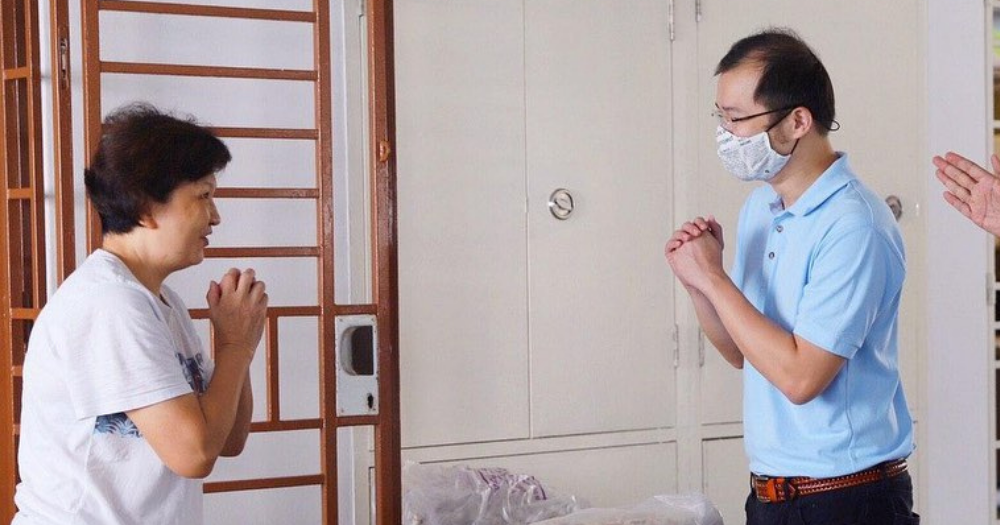Workers' Party's (WP) Louis Chua Kheng Wee gave his first speech in Parliament on Sep. 3.
He addressed the unprecedented impact and subsequent challenges Covid-19 has had on Singapore and the world.
With the country facing a recession, the poor and underprivileged have taken the greatest hit.
Covid-19 a 'tsunami' for the less privileged
The Member of Parliament for Sengkang said that for the lucky few in the population who can rely on their savings, Covid-19 was merely a "passing storm, or the proverbial rainy day".
However for the more vulnerable and less privileged, Covid-19 is a "tsunami" that can threaten not just their livelihoods, but their lives themselves.
In order for Singapore to emerge stronger as a nation, he called on the government to evaluate its success more holistically.
"We should base our policy decision making on not just maximising financial value, but on maximising the overall well-being of all Singaporeans, particularly the most vulnerable among us," Chua said.
Chua proceeded to highlight four areas for reform to build a stronger and more resilient Singapore in the post-pandemic landscape.
Strengthening workers' protection
Chua highlighted the need for workers to receive direct support and financial buffers in light of the recent spate of unemployment, instead of blanket wage subsidies.
From the increase in unemployment rate in the second quarter of 2020, "subsidies to companies and the past approach of moral suasion cannot prevent job losses".
Employment laws and social safety nets should be strengthened as well to better support and protect workers, Chua said.
This was something Prime Minister Lee Hsien Loong noted in his speech on Sep. 2 as well.
HDB's expiring leases
The second area Chua focused on was lease decay of HDB housing.
Despite efforts to ensure that public housing remains affordable for Singaporeans, lease decay has "serious implications for the retirement adequacy of Singaporeans", as most people's assets are tied to their primary residences.
Considering that majority of Singaporeans living in HDB flats rely on their CPF ordinary account balances to pay their mortgage, the depreciating value of their flats can be a source of stress.
This "elephant in the room", as Chua described, should not be ignored and should instead rank high on the government's priorities.
More flexible work arrangements
Chua stressed the need for more family-friendly policies, considering the declining total fertility rate in Singapore.
He emphasised the significance of sustainable growth, not just fiscal sustainability, but also the future sustainability of the country's most important capital, its people.
Chua said that the circuit breaker period and work-from-home system has shown that "economic competitiveness need not come at the expense of our families".
Recognising this as a "silver lining", Chua called for more flexible working arrangements as opposed to just giving employees non-legally binding advisories and recommendations.
Using reserves
The last area for reform Chua touched on was the use of reserves.
Agreeing that the government's expenditure for policies should not and cannot exceed its revenues, Chua pointed out that policy proposals that tap into reserves should be seen in the context of the country's needs in areas like healthcare.
He cited an example of "untapped revenue", namely how land sales are excluded from the official budget. However, capital receipts from land sales act as a potential source of recurring cash revenue.
Chua suggested that the government can tap on no more than one-fifth of the approximate S$15 billion of land sales a year.
Chua also suggested that the Net Investment Return Contributions (NIRC) can be raised by up to 10 per cent.
Acknowledging the need to safeguard Singapore's reserves, he said that increasing the percentage returns generated from net assets will "vary the pace" of the growth of the reserves, and not cause them to fall.
At the moment, 50 per cent of the net investment returns on the net assets are invested by GIC, Temasek, while the other 50 is derived from past reserves from remaining assets.
However this point was previously addressed by PM Lee in his speech and exchange with WP's Pritam Singh the day before (Sep. 2), in which he talked about the mindset of viewing the reserves as a rainy day fund.
PM Lee said there was no guarantee that reserves would always grow, and depending on the markets the investments might go down despite the best management of Temasek and GIC.
"And I suggest our mindset should be what I have planned for the future, I think of as only touching them in extremis," said PM Lee.
Chua concluded his speech by highlighting the need to foster a more open-minded culture where dissenting views and bold ideas are encouraged instead of quashed.
"I sincerely hope that the Government will have the courage and political will, to translate the breadth and depth of ideas that members bring in this house, into concrete policies to take Singapore forward.
A united Singapore Together is not one that speaks with one voice. A united Singapore is one with a diversity of voices, sharing our common belief for a better future and working together as one."
Totally unrelated but follow and listen to our podcast here
Top photo from Chua Kheng Wee / FB
If you like what you read, follow us on Facebook, Instagram, Twitter and Telegram to get the latest updates.
